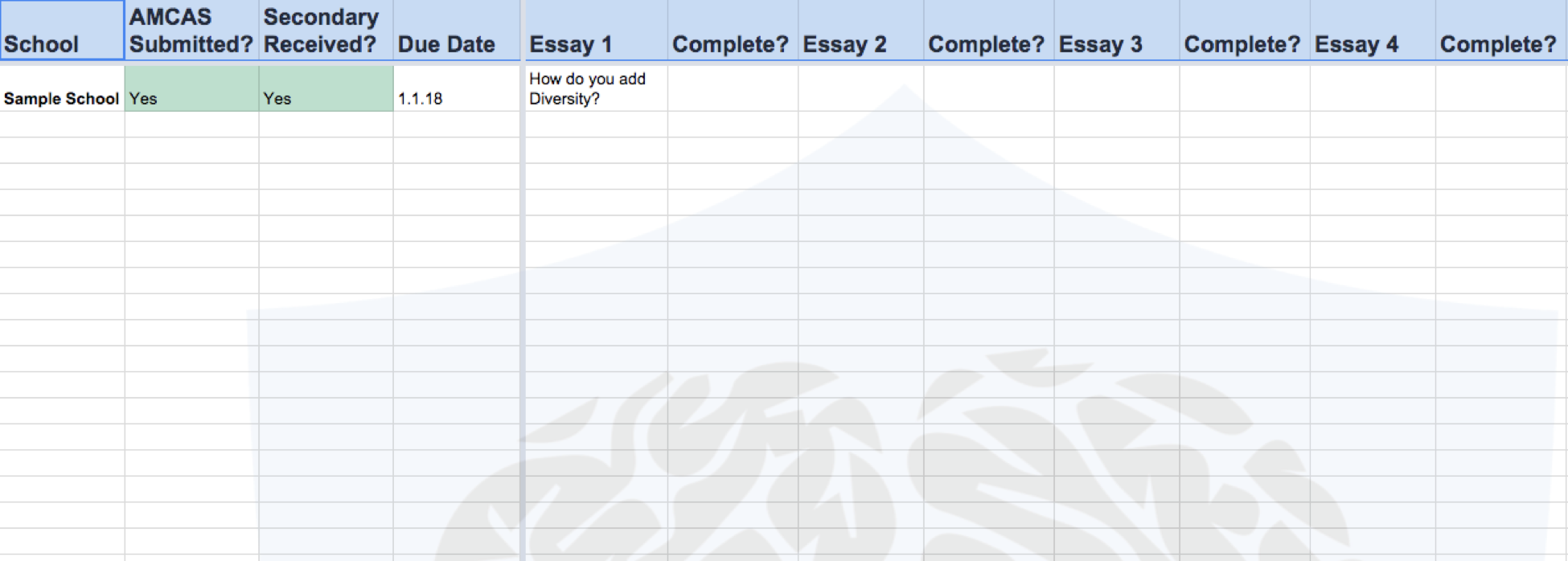Last Updated on June 26, 2022 by Laura Turner
I always think of secondaries as the real meat of the med school application process. For many schools, the AMCAS, AACOMAS, and TMDSAS merely function as a screening process, allowing them to weed out candidates who are clearly unqualified or do not meet their admissions criteria. Thus, your secondary applications will often serve as the critical factor in determining whether you are offered an interview, and ultimately, whether you will be admitted.
While some schools only send secondary applications to applicants who meet certain admissions criteria—such as minimum GPA or MCAT scores—other schools automatically generate a secondary upon receipt of your primary application. These secondaries vary tremendously in content. Some require nothing more than your name and payment, while others include up to ten essays and are extremely time-consuming.
When to submit
Similarly, the deadlines for these essays vary, with some schools giving you only one week from the time the application is sent. Generally speaking, you want to submit your secondary applications as quickly as possible—there is no benefit to delaying unless you are really struggling with your writing. Try your best to submit all secondary applications within two weeks of receiving them. Schools use the promptness of your submission (among other factors) to gauge your interest in their program.
Most schools’ admissions sites will post some sort of timeline of when and how they review applicants. Here is UCSF’s timeline, which clearly shows that applicants are reviewed on a rolling basis—meaning, that it is in your interest to send in secondaries earlier rather than later at this school.
Getting organized
Most essays are between 250-500 words. We generally recommend that students write out at least a brief outline for each of the types of questions (see below) before they have received the secondary application. It will save you a lot of time, and get you in the right mindset.
In order to make this process easier, I would suggest creating some sort of tracking system to organize all of your prompts. Something as simple as a spreadsheet will work:

The most common themes
You must be prepared to answer questions in these 12 general categories!
Most schools change their secondary essay prompts from year to year. However, there is some good news: despite these ever-changing topics, secondary essays tend to fall into about 12 general categories. Thus, it is possible, with some creative editing, to recycle certain “core essays” by making effective modifications.
**Please note, however, that one of the most common mistakes made on secondary essays is a failure to respond directly to the prompt—typically as a result of copy/pasting or hurried revisions to a recycled essay. In short, don’t be lazy, and read the prompts carefully!
The general essay categories are as follows (note: the first three topics are generally considered the most common or frequently asked):
- Diversity/Uniqueness – What diverse or unique element will you bring to their medical school community?
- Why School – Explain why you wish to attend this particular medical school.
- Personal Challenge or Moral Dilemma – Describe a challenge you overcame or a time when you faced an ethical dilemma, and how you learned and grew from that experience.
- Additional Information – Is there any other information you would like to share with the admissions committee?
- Post-College Activities – If you graduated before you applied, summarize your activities since you graduated.
- Most Important Relationship – Who is the most influential person in your life and why?
- Academic Awards – List any honors or awards you received while in college or beyond.
- Research – What research or independent academic work have you completed, and what did you accomplish or learn?
- Long-Term Goals – What do you want to practice after medical school?
- Personal Insight – Write an essay that gives us insight into your personality and character.
- Qualities/Characteristics – Describe the characteristics that make you who you are. How will they impact your success as a medical student and physician?
- Most Important Activity – From the list of activities and experiences listed in your AMCAS application, please select one that has most impacted your decision to enter medicine.
Five tips to implement on your secondaries
There are tons of articles explaining the generic to-do’s and not-to-do’s for secondaries, so I won’t spend a ton of time on them. There are, however, a few not-so-basic points that everyone should follow.
Think like an admissions committee
Many adcoms are made up of professors and students. You must write to please that particular audience. If you suspect that one of your would-be peers would read your application and say, “I would hate to be with this person in the class,” you’re in trouble. No amount of qualification or credentialing can save you if your prospective peers and professors think you would be a pain in the butt in class.
Moreover, these people have to read hundreds of essays, so keep your vocabulary simple and your sentences short. As you may have heard, medical students and doctors are not always known for their reading comprehension skills. Try to keep sentences under 15 words, where possible. Don’t use big words if a smaller word will suffice.
Finally, these are humans reading your essays, and as such, they will get insanely bored reading applications, 75% of which sound identical. Their eyes will inevitably glaze over. Thus, you need to grab their attention, particularly with your opening sentences.
The best medical school essay I ever read began with: “Nobody cares when someone dies in Cape Town.” That is a sentence that grabs the reader. While not every essay can begin with a mic-dropping opener, you should still remember that part of your job is to keep your audience engaged.
Do not repeat yourself!
The adcom already has your AMCAS application. Repetition will not help you at all. You need to be providing new information. That doesn’t mean that you cannot talk about the same activities or experiences—you certainly can. It means that you need to discuss another angle of that particular experience.
For instance, if you previously discussed the ways your humanitarian work changed your priorities, perhaps you could now discuss the ways your humanitarian work influenced your interest in a particular practice area, such as epidemiology or plastic surgery.
There are two themes- yours and the school’s- and you must maintain both
Theme #1: The first theme is yours. We call it the Application Persona, some people call it a “hook,” or a “personal narrative,” but ultimately it is the catchphrase that the adcom will use to remember and describe your application. That persona should be woven into your secondary essays in the same way it was woven into your AMCAS application.
Theme #2: Complicating matters is our second theme: the theme of the institution. Every institution has a “thing” it is known for. Oftentimes, it’s on their “About This School” page on their website. Sometimes, they will go the extra mile and build it right into the application, such as Johns Hopkins, which opened their secondary application with this paragraph:
“Ranked at the top for research, Johns Hopkins Medical School provides a medical education with an emphasis on integrating scientific innovation in patient care. The school’s mission statement shares a comprehensive and long-term perspective on medical education, touching on The Science and Practice of Medicine, Clinical Competence, The Social Context of Medicine, Communication, Professionalism, and Lifelong Learning. Given these tenets, describe how your background and experience has prepared you to excel in these areas as you write your secondary essays.”
Thus, Hopkins has announced its theme. Before you start writing, you need to think carefully about how your theme interacts with the school—basically, the common area on the Venn diagram of medical practice and research, where your uniqueness and their uniqueness combine to produce something more than their constituent parts.
Answer the prompt directly
Too many people get caught up in what they want to say, and completely fail to answer the question. Make sure your answer is directly responsive to the question and doesn’t take any significant detours.
Be consistent with your primary application
I don’t just mean your theme. I mean don’t write anything that contradicts or otherwise calls into question something you wrote on your AMCAS/AACOMAS/TMDSAS. And off of that point, don’t write about anything you can’t speak about in-depth during your interviews. Be consistent.
Updated July 6, 2021. The article was updated to correct minor grammatical errors and to update information.
Joel Butterly is the Co-Founder and CEO of InGenius Prep, an admissions consulting company that helps students with their applications to medical school.


Comments are closed.